Wu Shuang Pu - Table of Peerless Heroes
The figures are from a book of woodcut prints (Wu Shuang Pu) originally published in the late 17th century (33rd year of Kangxi reign, 1694, by a painter known as Jin Guliang. This book that has been reprinted at numerous occasions consist of of wood block prints, is called Wu (No) Shuang (Peerless, parallel, rivaled) Pu (book, score) contains the painter's imagined portraits of 40 heroes and heroines from the Han to Song dynasties. In his forewords to the volume, Jin stated that these exemplary characters were no longer seen, therefore, no parallel, wushuang.
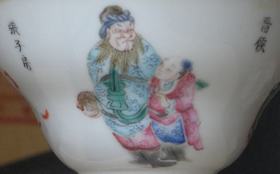
1) Zhang Liang (ca.250-189 BC), courtesy name Zifang, formally Marquess Wencheng of Liu (Liu Hou), was a distinguished statesman of the early Western Han period. Zhang was the descendant of a noble family of State of Han during the Warring States Period — his father, grandfather and great-grandfather (a total of five generations) were all royal officials of the state of Han. He later joined Liu Bang in 208 BC to rebel against the rule of Qin and helped him establish the Han Dynasty, after which he soon retired and became a practitioner of Taoism. Zhang Liang was considered one of the Three Pillars of Liu Bang's victory, along with the Han Xin, the grand-general of Han forces and Xiao He, the first Prime Minister of the Han Dynasty.
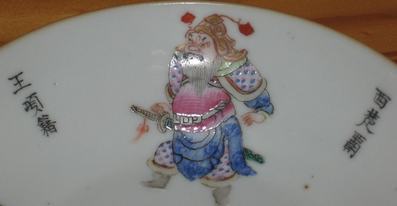
- 2) Xiang Yu (232-202 BC) was one of the most prominent generals in China history. His name was Ji, Yu was his courtesy name. He was a descendant of Xiang Yan, a general of Chu nobility. It took him only a few years to overthrow the Qin Dynasty, but he was poor at diplomacy, management and administrative affairs. He is traditionally viewed as having an impetuous nature by Chinese historians, and that further inability to realize his shortcomings doomed him to failure during his struggle with Liu Bang over supremacy of China. He is commonly known by his self-styled title of Xichu Bawang.
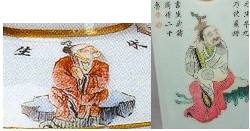
- 3) Fu Sheng (ca.260-170 BC) was a Confucian scholar who took part in the early Han dynasty revival of classical learning in which scholarship attempted to repair the losses it had suffered through the infamous "Burning of the Books." He produced a copy of the Book of Documents which he had preserved by hiding it in the wall of his house and devoted the short remaining period of his life to transmitting his understanding of the text in a series of expository lectures.
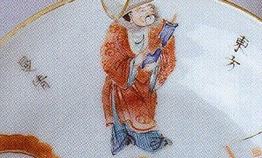
- 4) Dong Fang Shuo (154-93 BC) was the Han Premier and also the Taoist Cultivator who gain Immortal-hood. Always being seen carrying an Immortal Peach. His self-confidence and witty has made him a legend in Chinese folk tales.

- 5) Zhang Qian (164-114 BC) was an imperial envoy to the world outside of China in the 2nd century BCE, during the time of the Han Dynasty. He was the first official diplomat to bring back reliable information about Central Asia to the Chinese imperial court, then under Emperor Wu of Han, and played an important pioneering role in the Chinese colonization and conquest of the region now known as Xinjiang. Today Zhang Qian's travels are associated with the major route of transcontinental trade, the Silk Road. In essence, his missions opened up to China the many kingdoms and products of a part of the world then unknown to the Chinese. Zhang Qian's accounts of his explorations of Central Asia are detailed in the Early Han historical chronicles, Records of the Grand Historian or Shiji.
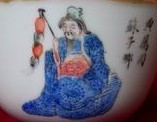
- 6) Su Wu (140-60 BC) was a diplomat and statesman during China's Han Dynasty, well-known in Chinese history for his faithfulness to his mission and his empire.
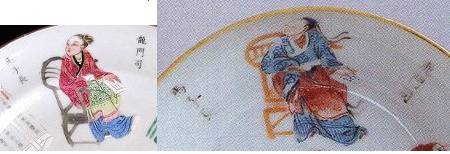
- 7) Si Ma Qian (ca.145-85 BC), forenamed Ma Zi Chang, was regarded as the father of Chinese historiography because of his highly praised work, Records of the Grand Historian, an overview of the history of China covering more than two thousand years from the Yellow Emperor to Emperor Han Wudi.
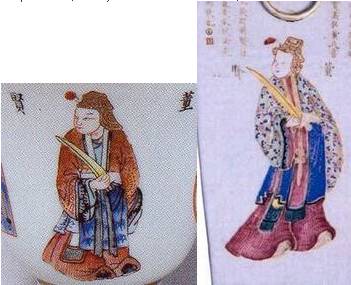
- 8) Dong Xian (23-1 BC) was a Han Dynasty politician who quickly rose from obscurity as a minor official to being the most powerful official in the imperial administration of Emperor Ai of Han, within a span of a few years. Most scholars agree that Dong's quick career advancement came mostly because of his personal relationship with Emperor Ai, likely a homosexual one, rather than a demonstration of abilities. Both men were married, but Emperor Ai, at least, was childless.
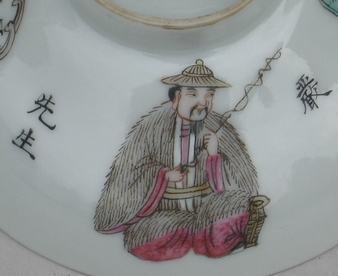
- 9) Yan Zi Ling (ca.0-75) was a scholar and studied together with the later Emperor Guang Wudi. He was refusing the offer of a high post from this Emperor, changed his name (Yan Xiansheng) and enjoyed the hermit life in the mountains and died there.
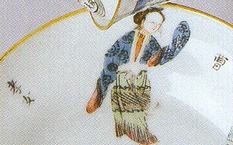
- 10) Cao E (ca.25-220) was a girl who fulfilled her filial duties to her parents. Cao lived in the Donghan Dynasty (25-220AD). Her father was drowned in a river and his body was never found. Cao, who was only 14, ran along the riverside and cried day and night. After seventeen days' search in vain, she jumped into the river on the 5th day of the 5th lunar month. Five days later, she appeared above the water with her father's body in her arms. The legend has spread far and wide. Today, you can still find the tomb of Cao E in Shao Xin, Zhejiang Province and the Cao E River that is named after the girl.
-
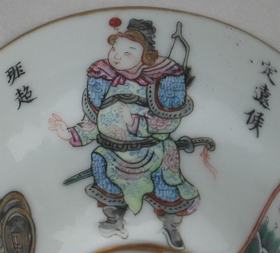
- 11) Ban Chao (33-103) was a Han Dynasty general and cavalry commander in charge of the administration of the Western Regions during the Eastern Han Dynasty. He repelled the Xiongnu and secured Chinese control on the Tarim Basin region, and led a military expedition to the heart of Central Asia. He was given the title of “Prince who Pacified the Far Terretories” (Ding Yuan Hou). He fought for 31 years.
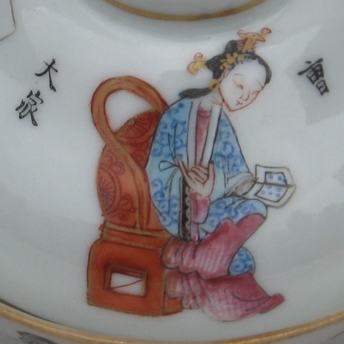
- 12) Ban Zhao (45-116) was the earliest woman historian. She continued to write and finished the historical book “Han Shu” (Book of Han) after her father and her elder brother. Besides working on the Han Shu and tutoring at the imperial library, Zhao also became a teacher to the leading women of the court.
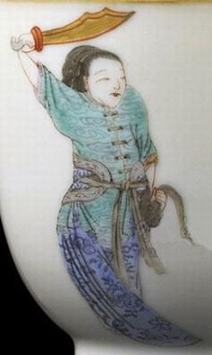
- 13) Zhao E (ca.220-280) usually appears by the name Zhao Eqin, Zhao E is most appropriate. She become famous for revenging her husband's death in broad daylight and she turned herself in to the authorities, and urged them to uphold the law, and execute her. In admiration of her sense of duty and her courage and enterprise displayed by a woman, she got amnesty instead of punishment.
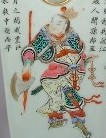
- 14) Sun Ce (175-200) was a military general and warlord during the late Eastern Han Dynasty and Three Kingdoms era in ancient China. In 200, when the rising warlord Cao Cao was away battling Yuan Shao in the decisive Battle of Guandu, Sun Ce was rumored to be plotting an attack against Cao Cao's capital of Xuchang. However, he was assassinated before he could carry out the plan.
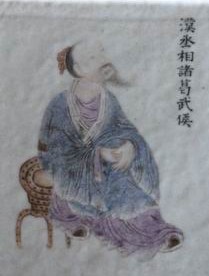
- 15) Zhu Ge Liang (181-234 AD) who lived during the Three Kingdom's period. He was the Prime Minister of Shou Dynasty and military strategist who had mastered the art of war. And he was also an accomplished scholar and inventor.
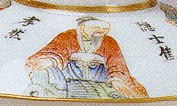
- 16) Jiao Xiao Ran (ca.481-221 BC) hermit in the State of Wei during the Warring States period (481-221 BC). Born in Hedong. After the disclosure of the Han state he retired to a remote river, lived in a little hut and did not speak a word to anyone. Summer and winter he wore no clothes, slept on the floor without a mattress and only ate every few days. He was physically neglected and dirty. He is said to have been over a hundred years when he died.
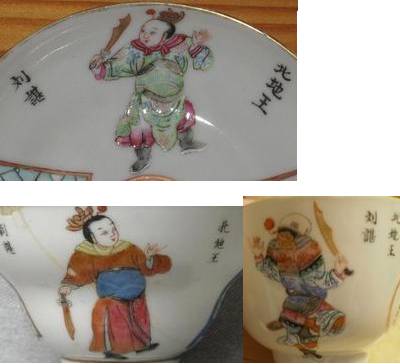
- 17) Liu Chen (220-265), Prince of Beidi was the fifth son of Liu Shan, the second ruler of Shu Han during the Three Kingdoms period of China. Liu Chen opposed the plans of Qiao Zhou to surrender to the opposing force under Deng Ai of Wei. Liu Chen attempted to convince his father to fight for the honor of Shu, so Liu Bei (the founder of Shu) could look upon him as a redeemed ruler of Shu. However, Liu Shan threw Liu Chen out of the court for this. He then went to Liu Bei's ancestral temple and killed his wife and children before committing suicide.
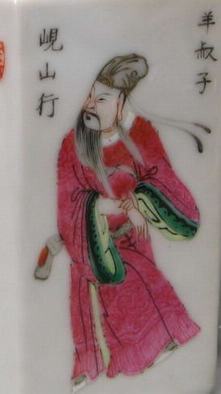
- 18) Yang Hu (ca.221-278), courtesy name Shuzi (Yang Shu Zi), was a Jin Dynasty (265-420) general whose great advocacy for plans to conquer the Eastern Wu finally persuaded Emperor Wu to carry them out, but he would not live to see the plans implemented. He was known for his humility and foresight.
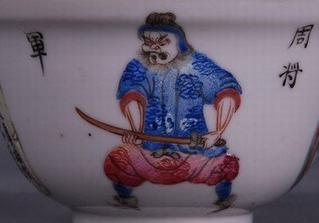
- 19) Zhou Chu (242-297) became an orphan at an early age. As a teenager he was stronger than most people and fond of hunting. He indulged in doing whatever he preferred, riding roughshod over local villagers, who then called him one of the "three harms" together with the fierce tiger in the Nanshan Mountain and the ferocious dragon in Changqiao. When heard about this, Zhou Chu learnt that he had been abhorred by the villagers. Hence he went into the deep mountain to shot the tiger and jumped into the river to fight against the dragon. For three days and nights, he finally managed to kill the dragon, after chasing after it for dozens of miles.
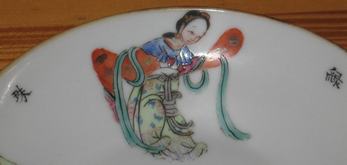
- 20) Lu Zhu (ca.250-300) was the favorite concubine of a wealthy man named Shi Chong, whose dates are usually given as 249-300. A general named Sun Xiu coveted Shi's favorite concubine. When Shi refused to hand over the girl, General Sun sent troops to seize her. Rather than be taken, Lu Zhu leapt to her death from an upper storey.
-
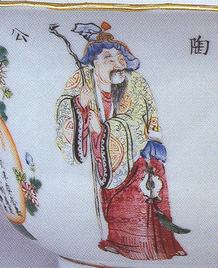
- 21) Tao Yuan Ming (365-427) was one of the most influential pre-Tang Dynasty Chinese poets. His grandfather, his father were all feudal officials, who succumbed themselves to Confucianism. Tao Yuan-ming's life was a struggle between the "learn and use" theory of Confucianism and the "return to nature" theory of Taoism. "Notes on Tao Hua Yuan" was the ultimate representation of his Taoism beliefs, it became one of Tao Yuan-ming's masterpieces. In the article, he constructed an eden outside the reality, an ideal society, a utopia, in which he wanted to live in himself. The article itself had been cited again and agin in other works after Tao Yuan-ming. If fact, "Tao Hua Yuan" has become a synonym for "utopia" in Chinese language.
-

- 22) Wang Meng (325-375), courtesy name Jinglüe (Wang Jing Lue), formally Marquess Wu of Qinghe, served as prime minister to the Former Qin emperor Fu Jiān in the fourth century. Under his governance, Fu Jiān's empire expanded from encompassing only most of Shaanxi, eastern Gansu, and extreme western Shanxi and Henan, to covering nearly all of then-Chinese territory north of the Huai River and the southwest. He is commonly regarded as one of the greatest statesmen in Chinese history.
-

- 23) Xie An (320-385) (Xie Anshi, Xie Gong, Jin Tai Fu), courtesy name Anshi, formally Duke Wenjing of Luling, was a Jin Dynasty (265-420) statesman who, despite his lack of military ability, led Jin through a major crisis. His line became one of the two most honored during the subsequent Southern Dynasties and in the minds of the people no less honored than imperial clans.
-
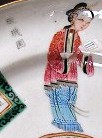
- 24) Su Ruo Lan (351-381) (Su Hui) was the wife of the official Dou Tao. The man had taken a concubine, whom his wife envied greatly. When he get a quarrel about the matter with Su he left Su with the concubine and broke all contact with her. Su Hui regretted her jealousy. She wove a costly cloth of many hued silk and wrote over 200 poems on it, to record her sorrow and regret. Her work later went down in history as “Xuan Ji Tu” of Tang Wuhou.
-
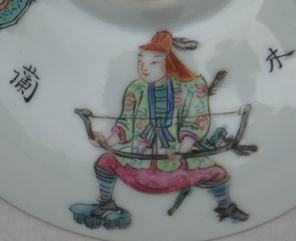
- 25) Hua Mu Lan (ca.400-500) was the brave woman who disguised herself as a man to take her aged father's place in the army. For over ten years, she fought as a man without her true identity being discovered. After the war ends, Mu-lan returns home to her family in victory and resumes her normal life.
-
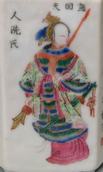
- 26) Xian Fu Ren (512-602) (Xishi) was a military and political leader of great stature and an important player in the process by which the Chinese came to exercise control over the area "south of the ranges".
-
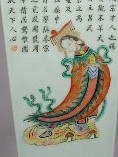
- 27) Wu Ze Tian (624-705). Wu Zetian personal name Wu Zhao, often referred to as Tian Hou during Tang Dynasty and Empress Consort Wu in later times, was the only woman in the history of China to assume the title of Empress Regnant, she reigned from 690-705.
-
-
-
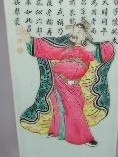
- 28) Liang Gong (607-700) was a palace secretary and general of the Tang dynasty under Wu Zetian. Fearlessly he attempted to persuade the empress against having a huge statue of Buddha cast, because of the high costs involved. He recommended many able people to the court, was defamed and sent to far away Pengze as district perfect. He was rehabilitated in 679 and recalled to the capital as palace secretary. He was very popular with the people
-
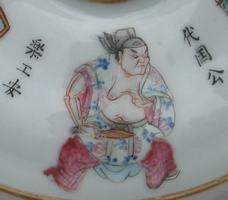
- 29) An Jin Cang (ca.620-680). An Jincang was a high ranked officer during the Tang dynasty, from Chang'an. The title he held during his lifetime was “Dai Guo Gong”. When the future emperor Ruizong was before the empress Wu Zetian and declared that all the suspicious were pure slender. His speech was as pure as his character. To reinforce his words he slit his stomach open with his sword. Wu Zetian immediately summoned doctors to attend to him and dropped her suspicious against the heir to the throne.
-
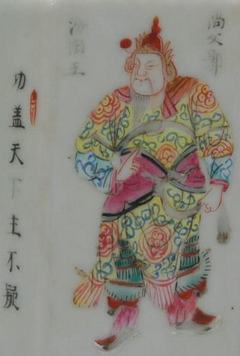
- 30) Guo Zi Yi (697-781). Guo Ziyi (Shangfu Guo/Changfu Guo), formally Prince Zhongwu of Fenyang (Fen Yang Wang), was a general during the Tang Dynasty who ended the An Shi Rebellion, and participated in expeditions against the peoples of Huihe (Uyghurs) and Tubo (Tibetans). He is reputed to be one of the greatest generals in Chinese history and was revered as the best general in East Asia during his lifetime. After his death, he was immortalized in Chinese mythology as the God of Wealth and Happiness.
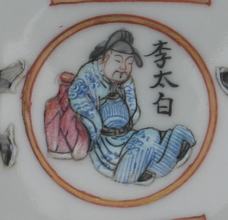
- 31) Li Bai (701-762) or Li Tai Bai (Li Po or Li Tai Po), literary name Qinglian Jushi, was a Chinese poet. He was part of the group of Chinese scholars called the "Eight Immortals of the Wine Cup" in a poem by fellow poet Du Fu. Li Bai is often regarded, along with Du Fu, as one of the two greatest poets in China's literary history. Approximately 1,100 of his poems remain today. Li Bai is best known for the extravagant imagination and striking Taoist imagery in his poetry, as well as for his great love for liquor. Like Du Fu, he spent much of his life traveling, although in his case it was because his wealth allowed him to, rather than because his poverty forced him.
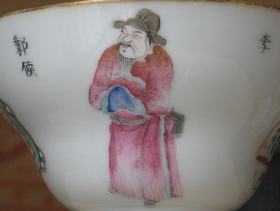
- 32) Li Bi (722-789), courtesy name Changyuan, formally the Prince of Liye fief (Liye Hou), was an official of the Chinese Tang Dynasty. He was a trusted advisor to four emperors and was a highly controversial figure in historians' commentaries, as he was viewed by some historians as frivolous and eccentric, while others praised him for his genius in matters of foreign policy and military matters.
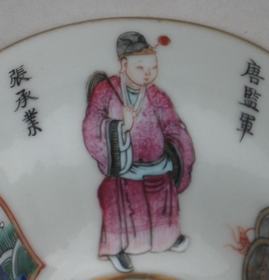
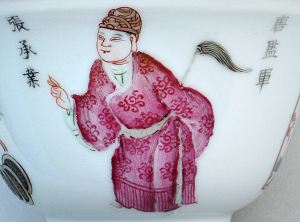
- 33) Zhang Cheng Ye (874-925) was a high ranked officer during the Tang Dynasty(Tang Jian Jun). When Li Cunxu, later Zhuanzong (923-926), proclaimed himself emperor there and started to lead a very extravagant lifestyle, the loyal Zhang Chengye refused to serve him, went on hunger strike and died.
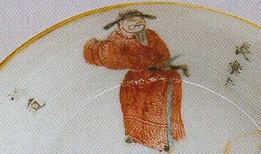
- 34) Feng Dao (882-954) called himself "The Old Man of Eternal Joy" (Chang Yue Lao). He was the Chinese government minister, in 932, ordered the Confucian classics printed using movable wood blocks. About a century after the invention of block-printing, Feng Dao significantly improved the printing process, and utilized it as a political tool. He is generally regarded as the inventor of modern printing in China. The first standard edition of the Confucian classics with commentary was published in 130 volumes between 932 and 953 in Xi'an. The improved printing technology quickly spread.
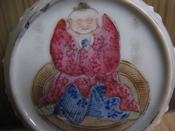
- 35) Chen Chuan (871-989). Chen Chuan (Chen Tuan) was a legendary Taoist sage. His birth name was Chen, his courtesy name was Tunan, his pseudonym as a sage was (Wade-Giles) Chen Hsi I (Pinyin) Chén Xīyí or Master Xīyí or Fúyaozǐ. In Chinese, he is often respectfully referred to as "Aged Ancestor Chen Tuan" (Chén Tuan Lǎozǔ) and "Ancestral Teacher Xiyi" (Xīyí Zǔshī). Little is certain about his life, including when and where he was born. He was born around the end of the Five Dynasties and Ten Kingdoms Period and the start of the Song Dynasty, possibly in what is now Luyi in Henan Province. He is said to have created the kung fu system Liuhebafa ("Six Harmonies and Eight Methods"). Along with this internal art, he is also said to be associated with a method of chi (energy) cultivation known today as Taiji ruler, sleeping meditation, a 24 Daoyin Qigong Method seated and standing exercises designed to
- prevent diseases that occur during seasonal change.
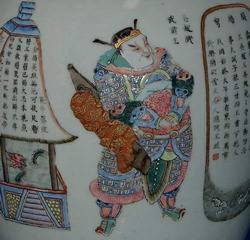
- 36) Qian Liu (852-932). Qian Liu (Qian X) was founder and first king of the Kingdom of Wuyue during the Five Dynasties and Ten Kingdoms Period in southern coastal China. Qian Liu was named the Prince of Yue in 902 with the title of Prince of Wu added two years later. When the Tang Dynasty fell in 907, to be replaced by the Later Liang Dynasty in the north, Qian Liu declared himself to be the King of Wuyue (Wu Yue Qian Wu Su Wang).
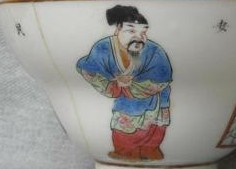
- 37) An Min (ca. 1050-1125) was a stonemason from Chang'an. During the Xining epoch (1069-1077) the notorious minister Cai Jing composed a text and ordered it to be inscribed on stele and set up in every province and every country. An Min was to inscribe the stele (Yuan You Dang Ren stele, on which the name of the fractions struggling for power and influence at the imperial court were inscribed). He asked that his name should not be mentioned on the stele.
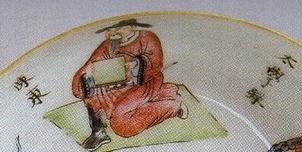
- 38) Chen Dong (1086-1127) was born in Danyang. During the reign of Qinzong he was given the rank of Taixue in the civil service. He petitioned the emperor to relieve Cai Jing and Tong Guan, among others, of their posts. Later he presented several patriotically motivated petitions to the emperor, in which he tried unsuccessfully to persuade him to dismiss Li Bangyuan and others and to take under his patronage Li Gang, who wanted to repel the Jin troops (1115-1234). Under the first emperor of the Southern Song dynasty (reigned 1127-1163) he publicly accused Huang Qianshang and Wang Boyan. They defamed him and in the end he was condemned to death.
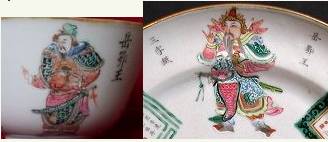
- 39) Yue Fei (1103-1142) (Yue E Wang) was a very famous general in the Song Dynasty (960-1279) who fought against the invasion of the State of Jin. During the 12th century, when Jurchen invaders from the north attacked China, General Yue Fei was commander of the Song armies. His attempt to push north and recover all the lost Chinese territory was opposed, however, by a peace-seeking party within the capital headed by the minister Qin Hui, who believed that further prosecution of the war would be too costly. Qin Hui's faction proved more influential, and in 1141 Yue Fei was recalled to the Song court and imprisoned. Later he was executed after being framed by Qin Hui.
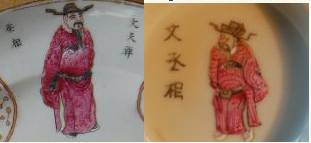
- 40) Wen Tian Xiang (1236-1283) (Wen Chengxiang). Wen Tianxiang was a Scholar general and Prime Minister during the Song Dynasty's, he got the title “the West River's Filial Son and Loyal Subject", which is one of the most famous symbols of loyalty and patriotism in China. Wen was the top scholar in the imperial examinations and successively held posts in the Ministry of Punishments and in local government offices in Hunan and Jiangxi. His writings are still taught in China's schools today.
The original source are a set of woodcuts of paintings by Jin Guliang of the edition with introduction dated 1690. The set was reprinted as [Wujin, Kiangsu Province : She yuan, 1929] and in 1992 [Hebei mei shu chu ban she (Shijiazhuang Shi), ISBN-10: 7531008157] and has been reprinted at numerous occasions.
The information on this page was collected by Arno Jacobs, based on information from members of the Gotheborg Diuscussion Board, Mr. Xujian Cui, Wikipedia and some other internet sources, and Georg Weishaupt's book 'The great fortune'.








































